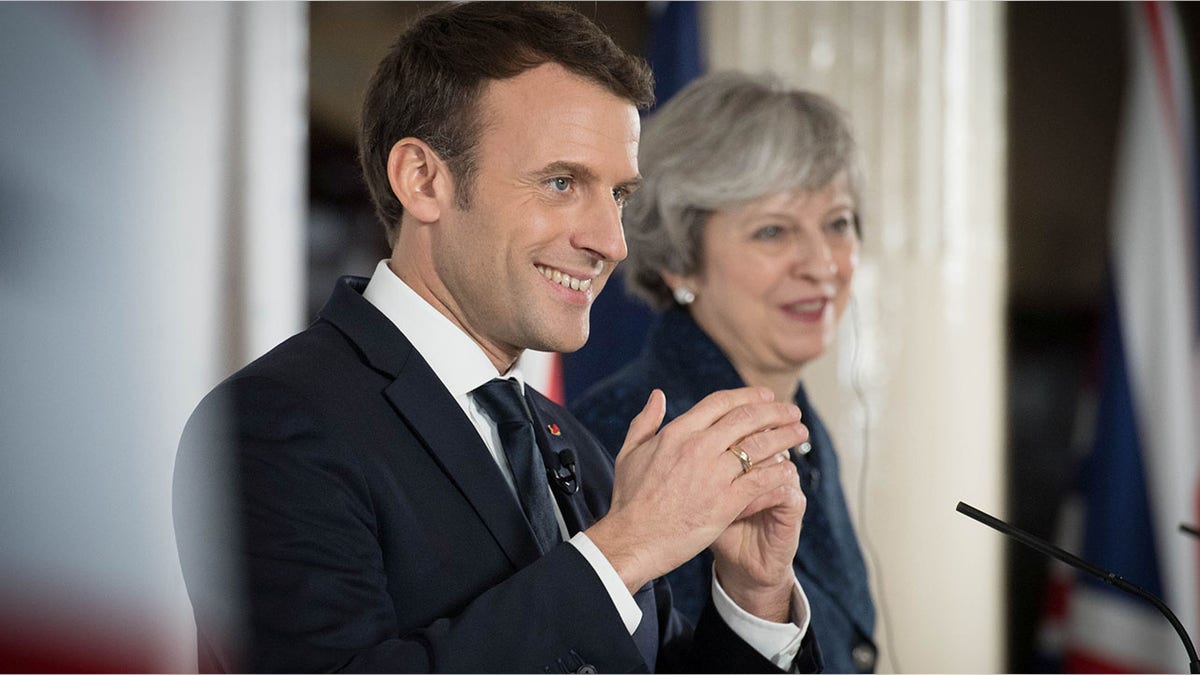
Macron has also called for more globalist policies
French President Emmanuel Macron won a significant victory Thursday when he and British Prime Minister Theresa May announced that Britain would pay for new border measures in France, while speeding up the movement of some migrants to the U.K.
At an Anglo-French summit in Berkshire, England, the two leaders announced the deal, which reforms the 2003 Le Touquet agreement that allows the U.K. to carry out border checks in France for migrants seeking to cross the English Channel.
The new Sandhurst Treaty sees Britain paying £44.5 million ($62 million) for border security measures including increased CCTV, more fencing and infrared technology.
The Le Touquet agreement, signed by then-U.K. Prime Minister Tony Blair and then-French President Jacques Chirac, has been controversial in France as it is blamed for the sprawling “Jungle” migrant camp in the border town of Calais for migrants and refugees seeking to enter the U.K.
The camp was deconstructed in 2016, resulting in migrants spreading out all over France and in nearby Paris. The French have been vocal in calling on the U.K. to do more to help with France’s refugee crisis. Meanwhile, many in Britain have blamed the situation in Calais -- where motorists and trucks were frequently attacked by violent migrants seeking to catch a ride into the U.K. -- on the French government not doing enough.
“If they are illegal immigrants, France should get rid of them, if they are people claiming refugee status, France should process them,” former U.K. Independence Party leader Nigel Farage said in an interview this week with the BBC. “It’s actually desperately simple but the French don’t want to do that and the truth of it for the last 10, 15, 20 years the French have been quite happy for camps to develop and for people to climb on the back of lorries to go to England, and then it’s our problem.”
The agreement announced Thursday will likely see more child migrants enter the U.K., by speeding up processing times, although May would not say how many would be accepted by the U.K. France’s Le Monde reported that the British had agreed to reduced transfer times of eligible migrants from six months to 30 days.
Asked by a journalist if Britain was getting the “thin end of the wedge” by sending money over to France and getting more migrants in return, May described the arrangement as “providing support to ensure we enhance security of our border.”
“This is in our national interests, and also in the interests of France to make sure we have as secure a border as possible at Calais and other ports,” she said.
Macron meanwhile took a tough stance on British attempts to leave the European Union while retaining access to the single market.
"If you want access to the single market...be my guest," he said when asked about Brexit. "But it means you need to contribute to the budget and acknowledge European jurisdiction."
The new agreement marks the latest sign of a toughening stance from European leaders in response to the continent-wide migration crisis. Britain voted to leave the European Union in 2016 in part due to concerns over migration, while Macron won election in 2017 only by beating right-wing and anti-migration candidate Marine Le Pen.
EUROPEAN LEADERS, FACING GROWING PUBLIC UNEASE, TOUGHEN UP ON IMMIGRATION
Macron has attempted to both adopt a welcoming tone to those in need, while getting tough on economic migration. During the campaign he had called to reform or scrap entirely the Le Touquet agreement, saying it was bad for France.
Back home, Macron is causing controversy among members of his own party with his tougher stance on immigration. A bill soon to go before the French parliament that would speed up asylum requests and deportations has drawn criticism from the French left. Critics claim that the definition of war refugee will be tightened so much as to exclude those still in genuine need.








































